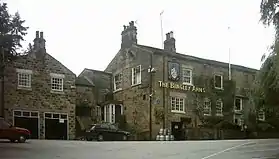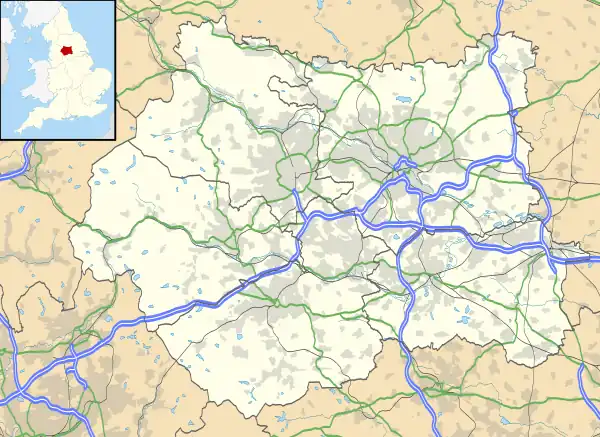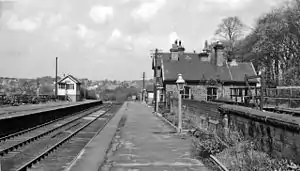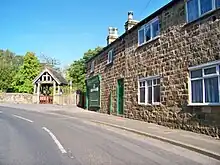Bardsey, West Yorkshire
Bardsey, West Yorkshire, England is a small village in the City of Leeds metropolitan borough, 8 miles (13 km) north east of Leeds city centre. The village is in the LS17 Leeds postcode district. It is part of the civil parish of Bardsey cum Rigton. The village itself lies just off the A58 road between Leeds and Wetherby.
| Bardsey | |
|---|---|
 Main Street: The Bingley Arms in Bardsey, perhaps Britain's oldest pub. | |
 Bardsey  Bardsey Location within West Yorkshire | |
| OS grid reference | SE367432 |
| • London | 170 mi (270 km) SSE |
| Civil parish | |
| Metropolitan borough | |
| Metropolitan county | |
| Region | |
| Country | England |
| Sovereign state | United Kingdom |
| Post town | LEEDS |
| Postcode district | LS17 |
| Dialling code | 01937 |
| Police | West Yorkshire |
| Fire | West Yorkshire |
| Ambulance | Yorkshire |
| UK Parliament | |
It is a predominantly middle class area with a high proportion of retired residents. Housing is mixed; while most is private, there is council housing situated near Keswick Lane. Facilities include a public house and sports club (with a cricket pitch and two football pitches). Bardsey also has a primary school and an Anglican church.
Etymology
The name of Bardsey is first attested in the Domesday Book of 1086 as Berdesei and Bereleseie, situated in the hundred of Skyrack.[1] The second element comes from the Old English word ēg ('island') and the first is agreed to be from a personal name. Exactly what this name was is not certain, but the name Beornrǣd is a plausible candidate. Thus the name probably once meant 'Beornrǣd's island' (or the island of someone of a similar name). Since the site is not in fact an island, it has been suggested that the name was metaphorical, referring to a hill rising, island-like, from flat ground.[2]
History
Nearby earthworks named Pompocali, in the parish of Scarcroft, are of uncertain origin, but possibly a result of quarrying. A minor Roman road lies alongside it, suggesting that Pompocali results from Roman activity.[3]
A motte-and-bailey castle dates back to the time immediately following the Norman conquest.[4] Bardsey also claims the oldest Anglo-Saxon tower church in England, with the tower of All Hallows church dating back to c. 850–950.[5]
The Bingley Arms is a public house that claims to be England's oldest public house, and to be recorded in the Domesday Book, although these claims are disputed.[6]

Bardsey railway station on the Cross Gates–Wetherby line opened in 1876 and closed in 1964.[7]

Notable people
- William Congreve (1670–1729), an English playwright, poet and Whig politician.[8]
- John Whittington (1837–??), an English first-class cricketer.[9]
Location grid
References
- Bardsey in the Domesday Book. Retrieved 19 October 2017.
- Harry Parkin, Your City's Place-Names: Leeds, English Place-Name Society City-Names Series, 3 (Nottingham: English Place-Names Society, 2017), p. 20.
- Hill, H. M. "Archaeology of Pompocali Earthworks and Hetchell Crags". Archived from the original on 28 September 2007.
- Historic England. "Castle Hill motte and bailey castle (1012774)". National Heritage List for England. Retrieved 19 October 2017.
- Historic England. "Church of All Hallows (1135652)". National Heritage List for England. Retrieved 19 October 2017.
- Fox, Geoff (15 February 2005). "Beware mock heritage in our 'historic' pubs". Yorkshire Evening Post. Retrieved 14 December 2007.
- Catford, Nick. "Bardsey". Disused Stations. Retrieved 19 October 2017.
- Historic England. "Bardsey Grange & Congreve Cottage (1135656)". National Heritage List for England. Retrieved 16 October 2019.
- "Player profile: John Whittington". CricketArchive. Retrieved 25 July 2023.
External links
 Media related to Bardsey, West Yorkshire at Wikimedia Commons
Media related to Bardsey, West Yorkshire at Wikimedia Commons- The Corpus of Romanesque Sculpture in Britain and Ireland: All Hallows, Bardsey, West Yorkshire
- Bardsey Village web-site
- Bardsey Cricket Club website
- "The Ancient Parish of Bardsey". Genuki. Archived from the original on 13 October 2007. Retrieved 1 November 2016.
_007.jpg.webp)